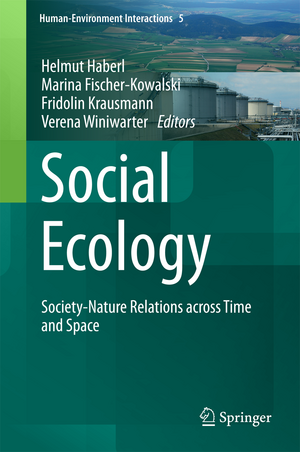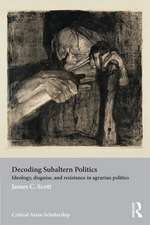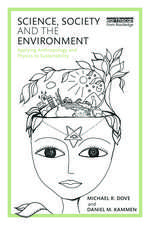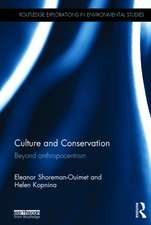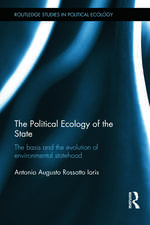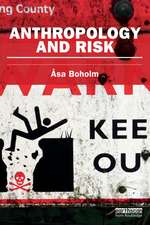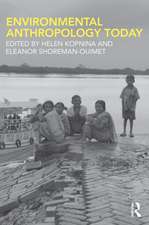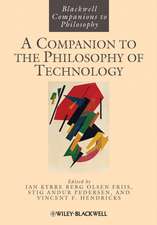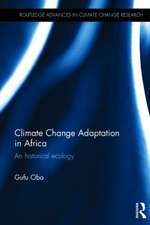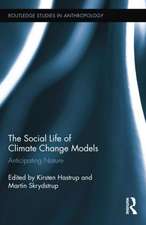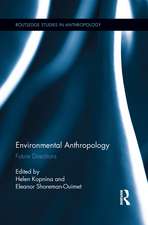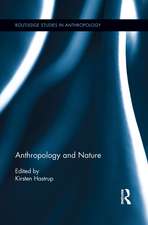Social Ecology: Society-Nature Relations across Time and Space: Human-Environment Interactions, cartea 5
Editat de Helmut Haberl, Marina Fischer-Kowalski, Fridolin Krausmann, Verena Winiwarteren Limba Engleză Hardback – 15 iul 2016
This book presents the current state of the art in Social Ecology as practiced by the Vienna School of Social Ecology, globally one of the main research groups in this field. As a significant contribution to the growing literature on interdisciplinary sustainability studies, the book introduces the purpose and nature of Social Ecology and then places the “Vienna School” within the broader context of socioecological and other interdisciplinary environmental approaches. The conceptual and methodological foundations of Social Ecology are discussed in detail, allowing the reader to obtain a broad overview of current socioecological thinking. Issues covered include socio-metabolic transitions, socioecological approaches to land use, the relation between actor-centered and system approaches, a socioecological theory of labor and the importance of legacies, as conceived in Environmental History and in Long-Term Socio-Ecological Research. To underpin this overview empirically, the strengths of socioecological research are elucidated in cases of cutting-edge research, introducing a variety of themes the Vienna School has been tackling empirically over the past years.
Given how the field is presented – reflecting research carried out on different scales, reaching from local to global as well as from past to present and future – and due to the way the book is structured, it is suitable for classroom use, as a primer, and also as an overview of how Social Ecology evolved, right up to its current research frontiers.
| Toate formatele și edițiile | Preț | Express |
|---|---|---|
| Paperback (1) | 972.63 lei 38-45 zile | |
| Springer International Publishing – 31 mai 2018 | 972.63 lei 38-45 zile | |
| Hardback (1) | 1142.28 lei 3-5 săpt. | |
| Springer International Publishing – 15 iul 2016 | 1142.28 lei 3-5 săpt. |
Preț: 1142.28 lei
Preț vechi: 1393.02 lei
-18% Nou
Puncte Express: 1713
Preț estimativ în valută:
218.57€ • 229.03$ • 180.69£
218.57€ • 229.03$ • 180.69£
Carte disponibilă
Livrare economică 21 martie-04 aprilie
Preluare comenzi: 021 569.72.76
Specificații
ISBN-13: 9783319333243
ISBN-10: 3319333240
Pagini: 640
Ilustrații: LXII, 610 p. 94 illus., 47 illus. in color.
Dimensiuni: 155 x 235 x 41 mm
Greutate: 1.41 kg
Ediția:1st ed. 2016
Editura: Springer International Publishing
Colecția Springer
Seria Human-Environment Interactions
Locul publicării:Cham, Switzerland
ISBN-10: 3319333240
Pagini: 640
Ilustrații: LXII, 610 p. 94 illus., 47 illus. in color.
Dimensiuni: 155 x 235 x 41 mm
Greutate: 1.41 kg
Ediția:1st ed. 2016
Editura: Springer International Publishing
Colecția Springer
Seria Human-Environment Interactions
Locul publicării:Cham, Switzerland
Cuprins
Chapter 1 - The Archipelago of Social Ecology and the Island of the Vienna School.- Chapter 2 - Core Concepts and Heuristics.- Chapter 3 - Transitions in Sociometabolic Regimes Throughout Human History.- Chapter 4 - Beyond Inputs and Outputs: Opening the Black-Box of Land-Use Intensity.- Chapter 5 - ‘Society Can’t Move so Much as a Chair!’ - Systems, Structures and Actors in Social Ecology.- Chapter 6 - Why Legacies Matter: Merits of a Long-Term Perspective.- Chapter 7 - Toward a Socioecological Concept of Human Labor.- Chapter 8 - Long-Term Trends in Global Material and Energy Use.- Chapter 9 - More than the Sum of its Parts: Patterns in Global Material Flows.- Chapter 10 - Boundary Issues: Calculating National Material Use for a Globalized World.- Chapter 11 - How Circular is the Global Economy? A Sociometabolic Analysis.- Chapter 12 - Material Stocks and Sustainable Development.
Recenzii
“Highly recommendable for environmental historians. … An innovative feature of the book are the so-called Method Precis lessons. These insertions provide in-depth studies of several empirical approaches and explain the applied methods in a comprehensive manner, making a twofold contribution.” (Reinhard Ferdinand Nießner, Austrian Environmental History, Vol. 27, May, 2019)
Textul de pe ultima copertă
This book presents the current state of the art in Social Ecology as practiced by the Vienna School of Social Ecology, globally one of the main research groups in this field. As a significant contribution to the growing literature on interdisciplinary sustainability studies, the book introduces the purpose and nature of Social Ecology and then places the “Vienna School” within the broader context of socioecological and other interdisciplinary environmental approaches. The conceptual and methodological foundations of Social Ecology are discussed in detail, allowing the reader to obtain a broad overview of current socioecological thinking. Issues covered include socio-metabolic transitions, socioecological approaches to land use, the relation between actor-centered and system approaches, a socioecological theory of labor and the importance of legacies, as conceived in Environmental History and in Long-Term Socio-Ecological Research. To underpin this overview empirically, the strengths of socioecological research are elucidated in cases of cutting-edge research, introducing a variety of themes the Vienna School has been tackling empirically over the past years.
Given how the field is presented – reflecting research carried out on different scales, reaching from local to global as well as from past to present and future – and due to the way the book is structured, it is suitable for classroom use, as a primer, and also as an overview of how Social Ecology evolved, right up to its current research frontiers.
Caracteristici
The book comprehensively presents the current state-of-the-art of the Vienna School of Social Ecology The conceptual repertoire of Social Ecology is exemplified by a cornucopia of empirical studies presenting exciting original research The book differs from most edited volumes by its high internal consistency achieved through stringent editing and organization of several author’s workshops Method Précis outline socioecological research methods and guide the reader to more detailed methodological publications through carefully selected references Due to its nature, the book is suitable for classroom use, as a primer and overview of Social Ecology as well as its current research frontiers Includes supplementary material: sn.pub/extras
